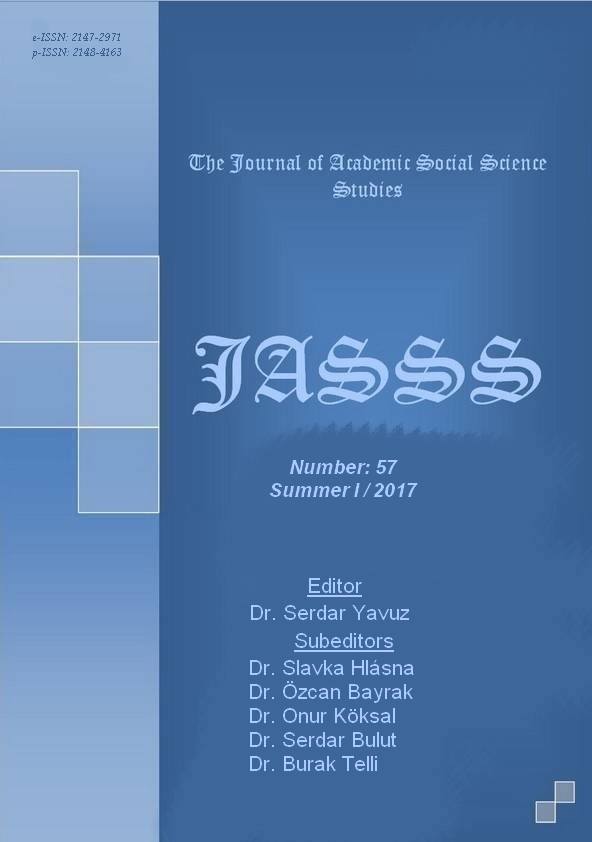TÜRK EĞİTİM SİSTEMİNİN DEĞERLENDİRİLMESİ: GÜNEY KORE, ÇİN HALK CUMHURİYETİ VE SİNGAPUR BAĞLAMINDA BİR KARŞILAŞTIRMA
Author :
Abstract
Yapılan bu çalışmada uluslararası değerlendirmelerde başarılı olmuş ülkeler arasında yer alan Güney Kore, Singapur, Çin Halk Cumhuriyeti (Şanghay ve Hong Kong Bölgesi) seçilmiş olup; bu ülkelerdeki zorunlu okula başlama yaşı, başarı ölçütleri, haftalık ders saati ve yıllık tatil süresi değişkenleri Türkiye ile karşılaştırmalı olarak incelenmiştir. Ayrıca Türkiye’ deki eğitim sistemine ilişkin bu değişkenlere yönelik yönetici ve öğretmenlerinin görüşlerinin belirlenmesi de amaçlanmıştır. Nitel araştırma yöntemi kullanılan bu çalışmada ilk olarak doküman incelemesi ve ikinci olarak olgu bilim deseni kullanılmıştır. Araştırmanın çalışma grubunu 2015-2016 eğitim öğretim yılında Fırat Üniversitesi Eğitim Bilimleri Enstitüsü Eğitim Yönetimi Teftişi Planlaması ve Ekonomisi Anabilim Dalında tezsiz yüksek lisans öğrenimine devam eden 30 okul yöneticisi ve 10 öğretmen oluşturmaktadır. Veriler içerik analizi ile çözümlenmiştir. Doküman analizi ile elde edilen bulgular değerlendirildiğinde ülkelerin belirlenen değişkenler bazında değerlendirmesi yapılmıştır. Eğitim sistemimizde zorunlu eğitim yaşı, başarı ölçütleri ve değerlendirmesi, ilk ve ortaokullarda yıl bazında tatil süreleri ve haftalık ders saati değişkenlerine ilişkin olarak okul yöneticilerinin ve öğretmenlerin görüşlerinin belirlenebilmesi amacıyla dört açık uçlu sorudan oluşan görüşme formu kullanılmıştır. Elde edilen verilerin analizinde ise içerik analizi yapılmıştır. İçerik analizinden elde edilen sonuçlara göre zorunlu eğitim yaşının ve tatil sürelerinin uygun çoğunlukla bulunduğu, başarının notla değerlendirilmesinin daha çok olumsuz etkisinin olacağı, ilkokul ve ortaokul kademelerindeki ders saatlerinin fazla olduğu vurgulanmıştır.
Keywords
Abstract
In this study, South Korea, The People’s Republic of China (Shangay and Hong Kong region) and Singapore which are among the countries being successful in the ınternational exams have been chosen; variables such as school starting age in compulsory education, success criteria, weekly course hours and annual vacation periods in these countries have been examined in comparison with our country. Moreover, it is aimed to determine the opinions of administrators and teachers on these variables in respect of the education system in our country. In this study carried out by qualitative research method, first, documents have been examined and then phenomenology patterns have been used. The study group of the study is composed of 30 school administrators and 10 teachers who continue their graduate education without graduation at Fırat University Educational Sciences Institute Educational Management Inspection Planning and Economics Department in 2015-2016 academic year. The data were analyzed by content analysis. When evaluating the findings gained with examination of the documents, the countries have been evaluated based on the variables set. An interview form containing four open-end questions have been used in order to determine the opinions of the administrators and teachers regarding the variables of compulsory school starting age, success criteria and assessment, vacation periods in primary and secondary schools and weekly course hours in our education system. In the analysis of the obtained data, content analysis was done. According to the results obtained from the content analysis, it is emphasized that the age of compulsory education and vacation periods are in the appropriate majority, that the evaluation of success is more negative, and that the number of lesson hours at the elementary and secondary levels is high.





